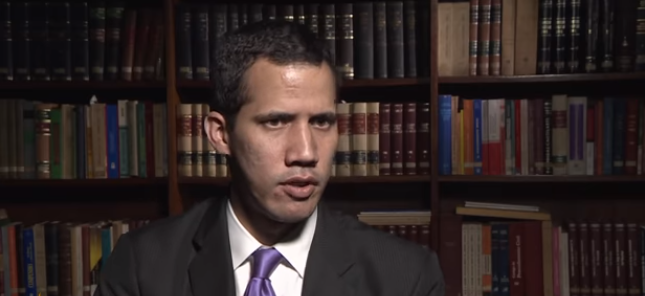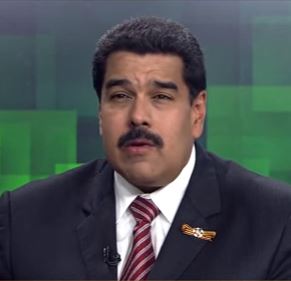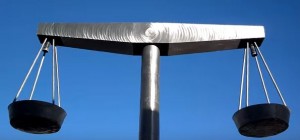
CARACAS, Venezuela (AP) — A defiant Juan Guaido returned home to Venezuela on Monday despite concerns the opposition leader might be detained and urged supporters at a rally to intensify their campaign to topple the government of President Nicolas Maduro.
The 35-year-old leader of Venezuela’s National Assembly showed off his passport before climbing onto scaffolding and pumping his fist during the demonstration in Caracas, delighting euphoric followers whose efforts to oust Maduro have fallen short in a nation gripped by a humanitarian crisis.
There were few security forces nearby and no immediate comment from Maduro’s government, which has tried to divert the public’s attention to carnival festivities Monday and Tuesday. While thousands of Venezuelans heeded Guaido’s call for protests coinciding with his return, many wonder whether he can maintain momentum against a government that, while under extreme pressure itself, has relentlessly cracked down on opponents in the past, jailing or driving into exile top opposition leaders.
“We know the risks that we face. That’s never stopped us,” Guaido said after arriving at Venezuela’s main airport and going through immigration checks. He was greeted by top diplomats from the United States, Germany, Spain and other countries who possibly hoped to head off any move to detain Guaido by bearing witness to his return.
“We hope there won’t be any escalation and that parliamentary immunity is respected,” said Spanish Ambassador Jesus Silva Fernandez.
The United States and some 50 other countries have recognized Guaido as the legitimate leader of Venezuela, arguing that Maduro’s re-election last year was invalid because popular opposition candidates were barred from running.
At the rally, Guaido called for massive protests on Saturday and said he would meet Tuesday with public employee unions controlled by the government of Maduro, who retains the support of military generals despite the desertion of hundreds of lower-ranking military personnel.
“The regime must understand, the dictatorship must understand… that we’re stronger than ever. We’ll continue protesting, we’ll continue mobilizing,” said Guaido, who had ignored an official ban on foreign travel to leave Venezuela last month.
Guaido visited Colombia, Brazil, Paraguay, Argentina and Ecuador over the past week — all countries that support his claim to be Venezuela’s interim president and call on Maduro to resign so that the country can prepare for free and fair elections.
The United States, which has warned Maduro not to act against Guaido, congratulated the opposition leader on his return to Venezuela.
“The international community must unite and push for the end of Maduro’s brutal regime and the peaceful restoration of democracy in Venezuela,” U.S. Secretary of State Mike Pompeo said. Colombian President Ivan Duque tweeted that Guaido’s homecoming was part of the “irreversible path that Venezuela has taken toward democracy.”
U.N. Secretary-General Antonio Guterres called for dialogue by all parties to end the political impasse.
“We obviously remain very concerned about the situation in Venezuela,” U.N. spokesman Stephane Dujarric said. “It’s important from the secretary-general’s viewpoint that all actors — all political actors in Venezuela and abroad — make all efforts to lower tensions.”
Maduro has said he is the target of a U.S.-backed coup plot after the Trump administration joined dozens of other countries in backing Guaido. The United States has also imposed oil sanctions on Venezuela, which has the world’s largest oil reserves.
Guaido’s return is a moment of reckoning not only for the opposition leader, whose presence in Venezuela was essential for his movement to regain momentum, but also for Maduro, analysts said. The fact that Guaido was not detained, at least so far, reflects the pressure Maduro faces not to intervene, said Luis Vicente Leon, head of the Caracas-based polling firm Datanalisis. “But it seems to indicate the beginning of a negotiation, local and international, whose details are not yet clear,” Leon said in a tweet.
Venezuela’s vice president, Delcy Rodriguez, did not directly address a question about whether Guaido could face arrest during an interview with Russian state-owned TV channel RT. But she left open the possibility, saying Guaido had broken the law and is “a Venezuelan who conspires with foreign governments to overthrow a constitutional government.”
The Maduro government has in the past jailed and driven into exile some of Venezuela’s most prominent opposition leaders, including Leopoldo Lopez, who lives under house arrest and another lawmaker holed up at the home of Chile’s ambassador in the Venezuelan capital.
For his part, Maduro has somewhat incongruously urged Venezuelans to enjoy the carnival season, even though most people don’t have the resources to travel to beaches or other holiday spots. On Sunday, he tweeted that Venezuelans nationwide were enjoying carnival “in peace and happiness.”
Among the demonstrators who waited for Guaido at the Caracas rally was Wilfredo Moya, a 55-year-old former construction worker who said Venezuelans hoping for change should be patient.
“It’s a long process,” he said.




